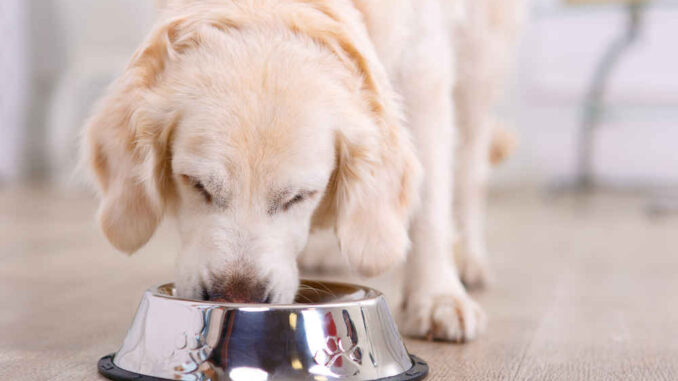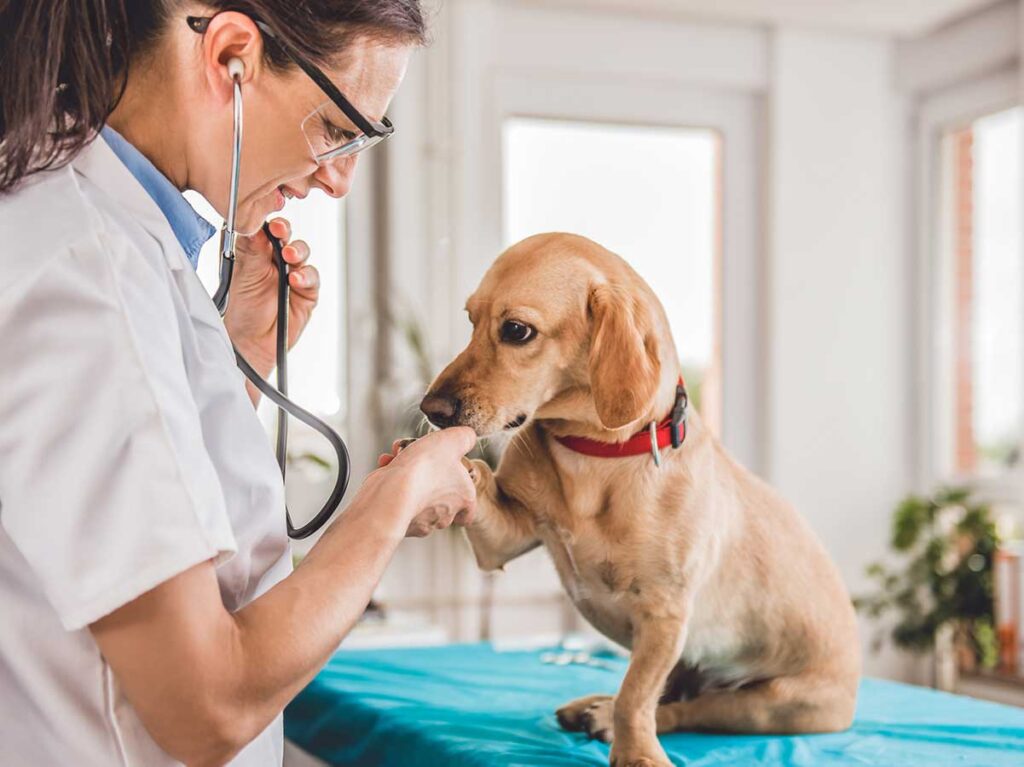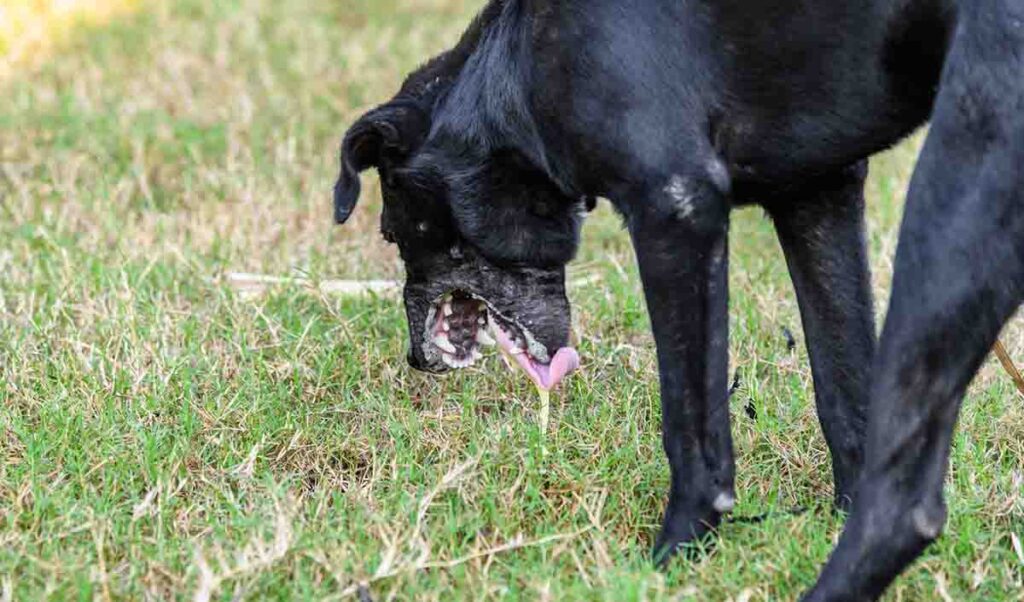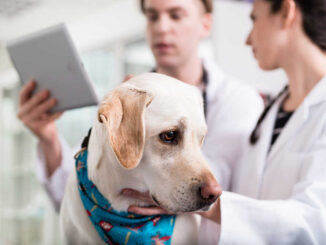
This article was updated on April 18th, 2023
Doggy vomit. It’s an affliction any dog parent is only too aware of. However, did you know that when it comes to “throwing up,” there are two different processes that could be going on, vomiting or regurgitation? Each has very different possible causes.
This article will consider the differences in the types of “throwing up,” what it could mean for your canine companion, and what your veterinarian may recommend doing about it.
What’s the Difference Between Vomiting and Regurgitation?
When your dog is bringing up their food, it is vital to try and distinguish whether they are regurgitating or vomiting. This is because they are two distinct processes, and depending on which your dog is doing, the list of possible causes and the tests and treatments can be very different.
Regurgitation
Regurgitation is a passive process; this means the tummy muscles will not be contracting, and the food may appear to almost fall out of his mouth. It will often seem effortless. It usually, but not always, occurs shortly after your pet has eaten something.
There may be some lip-smacking, drooling, and your dog may retch afterwards. The contents of regurgitation are usually either undigested food, which may come out in a cylindrical shape, or water. Your dog may attempt to eat the regurgitated material.
Vomiting
Vomiting, by contrast, is an active process. The body forcibly expels the stomach contents. Vomiting is accompanied by heaving and movement of the tummy muscles. What is vomited up may be undigested or digested stomach contents, depending on how long the food has been in your dog’s digestive tract. Bile (a yellow/green substance) may also be present in the vomit.
A Dog Throwing Up Undigested Food Several Times Should See a Vet
“An isolated incident of “throwing up” is usually not a cause for concern. However, if your dog is a regular offender or has had several episodes in a day, it’s worth a quick chat with your veterinarian. “
Top Reasons Causing Dogs to Throw Up Undigested Food
Regurgitation points to a problem with entry to the food pipe, the food pipe itself, or the stomach entrance. Common possible causes include:
1. Acid reflux
Acid reflux occurs when stomach acid leaks out of the stomach into the esophagus (food pipe), leading to irritation and inflammation. Reflux can happen for many reasons, including conformational issues (such as brachycephalic obstructive airway disorder) or stomach disorders such as inflammation, infections, or cancers. It may be a primary issue in some dogs, termed gastroesophageal reflux disease (GERD).
2. Esophagus disease
There are many different possible diseases of the esophagus that can lead to regurgitation. These conditions can result in your dog’s difficulty in moving food into the stomach. Some more common causes include:
- Obstruction: Also called “choke,” this happens when something gets stuck in the food pipe. Common culprits include bones and chew toys. Obstruction can damage and even rupture the food pipe, which can be fatal. Even after removal, damaged regions of the esophagus can become narrowed, leading to subsequent problems swallowing and further regurgitation. It is essential to say that feeding bones to dogs is not recommended. They pose a significant risk of tooth damage and gastrointestinal obstruction. There are many toys on the market these days that can safely satisfy your dog’s need to chew. Yes, dogs enjoy bones, but they will thank you in the long run for finding an alternative!
- Enlargement of the Esophagus (Megaesophagus): This can occur either as a “congenital” problem that a puppy is born with or occur secondary to medical problems such as auto-immune disease or hormonal diseases.
- Heart blood vessel congenital disease: This is a problem of the heart blood vessels (Persistent right aortic arch). It is a congenital issue that a puppy is born with, where a heart blood vessel that usually goes away as a puppy is developing persists. This persistent blood vessel wraps around the food pipe, leading to a narrowing that prevents solid food from passing. As a result, this condition usually becomes evident at weaning.
- Esophageal cancer: Sadly, dogs can suffer from cancer of the food pipe, but thankfully cases are rare.
3. Obstructive airway disease (For Brachycephalic Dogs such as Pugs)
“Brachycephalic” dogs are those with flat faces such as Pugs and Bulldog breeds. Their anatomy predisposes them to esophageal problems. These include “esophageal diverticula” (pouches in the esophagus where food can get stuck) and sliding stomach hernias – termed “hiatal hernias,” where the stomach slides in and out of the chest cavity through the diaphragm.
So what should you do if your dog is throwing up undigested food? Let’s review our 5 veterinarian tips:
7 Veterinarian Tips to Stop your Dog from Throwing Up Undigested Food

If your dog has persistent or recurrent vomiting, your veterinarian should assess them to rule out any serious or life-threatening conditions and ensure appropriate treatment is given. If your dog has mild signs and is otherwise well, then consider some of the following:
1. Withhold food
Historically there was the recommendation to withhold food if your dog has a tummy upset. We now know that nutrition is key to the gut’s ability to heal itself. Feeding a bland diet, little and often, may help your dog’s clinical signs. A dog that is throwing up should not be fed raw food.
2. Change your dog’s diet
Some dogs may throw up as a result of food sensitivity. This is usually a result of proteins rather than grains, despite food manufacturer advertising! After chatting with your veterinarian about your pet’s clinical signs, they may advise an exclusive food trial with a “hydrolyzed,” single-source protein diet. Usually, this will be recommended for 3 to 4 weeks initially. Any additional treats or tidbits at this time can derail this therapeutic trial and should be avoided.
Many food manufacturers market their food as hypoallergenic, but there are only a few brands that are hydrolyzed. Chat to your vet if you prefer to undertake a home-cooked diet trial. They may recommend you speak to a veterinary nutritionist to ensure the diet you prepare is not deficient in essential vitamins and minerals.
3. Adjust your dog’s meal frequency
Some dogs will benefit from changing their meal timings, frequency, or consistency, such as feeding three small meals or soaking kibble.
4. Discourage your dog from eating leftovers and garbage
It is best to avoid your dog having access to scraps or garbage wherever possible. If your dog is a repeat offender, then the use of secure trash bins is recommended. If your dog is very bad for scavenging for dead and rotten things on walks, consider using a basket muzzle to prevent them from eating things they shouldn’t.
5. Puzzle feeder
Sometimes slowing the rate your dog eats their food can help with signs of vomiting or regurgitation. The use of puzzle feeders is a great way to do this. They are also a great way to provide your canine companion with mental stimulation, enhancing well-being and reducing anxiety.
6. Probiotics
There is increasing evidence that our “microbiome” – the so-called healthy bacteria, fungi, and viruses that live in our gut – play a significant role in gut health. At this time, there is no strong scientific consensus to support their benefit in humans or animals. Still, there are reports of their benefits anecdotally, and I would recommend them to my patients with chronic gut disease.
7. At-home remedy
It is important never to give your pet human medications without consulting your veterinarian. This is because dogs’ bodies work differently from our own when it comes to processing drugs, and inadvertent drug toxicities can be fatal. There is anecdotal evidence that ginger can be beneficial for nausea, but please note that this can be contraindicated if your pet is on certain medications, so chat to your vet before giving it.
Other Ways to Help
Suppose your dog has been diagnosed with a specific medical disorder. In that case, your veterinarian may recommend specific lifestyle changes to help, such as a prescription diet, altering the consistency of your dog’s food, or, for example, in dogs with megaesophagus, the use of a “Bailey Chair” to assist with feeding from a height.
When to Worry / When to Call the Vet

1. Your dog won’t stop vomiting or vomits more than once
A dog that is constantly vomiting may have an obstruction in their gut and should see a veterinarian. They will likely advise imaging to rule out a possible foreign body. Additionally, dogs that appear to bring up lots of white foam and retch unproductively may have a condition called “Gastric Dilatation and Volvulus” (GDV). This is a life-threatening emergency that is more common in large breed dogs.
2. Your dog shows other symptoms
The frequency of vomiting is something owners should pay attention to. A one-off vomiting episode may not be anything to worry about if your dog otherwise appears to be feeling well; many dogs will vomit if they’ve eaten grass for example. However, if your dog seems lethargic or unwell, or if your dog is showing other symptoms such as diarrhea or fever, veterinary attention may be required.
3. Your dog is acting strangely after vomiting
Dogs that vomit or regurgitate are at risk of breathing in their vomit. This is called “aspiration pneumonia” and can be a fatal complication. Vomiting can also be the result of many possible medical problems. If your dog is behaving abnormally after vomiting or regurgitating, it is important to have them checked over by your local veterinarian.
4. When you find blood in your dog’s vomit
Blood can present in vomit either as fresh, bright red blood or digested blood – this will appear like coffee grounds. Vomiting blood always warrants an emergency veterinary consultation as it may indicate severe gut disease or a problem in the body’s ability to make blood clots. Clotting problems can lead to fatal bleeding episodes.
When to Go to Vet Emergency Services
If your dog is retching unproductively, collapsed, or has problems breathing, you must go straight to the emergency room. If you are unsure or worried and your local clinic is closed, then call your 24-hour emergency provider for advice.
Diagnosis: How Will the Vet Figure Out the Cause?
History
A thorough patient history helps determine if your pet is regurgitating or vomiting and check for other signs that may narrow down the list of potential causes. Make sure to tell your veterinarian about all medications, supplements, and vitamins you might give your pet, along with where you have walked them recently.
Physical exam
A hands-on assessment of your pet helps your vet identify possible clues as to what is causing your pet to vomit or regurgitate. It is also essential to determine how sick your pet is and whether they are stable enough to be managed with medication or need to be hospitalized.
Blood tests
As many diseases can cause vomiting, screening blood tests can be helpful to check organ function, blood cell counts, and markers of infection. If your dog suffers from severe or chronic signs or is vomiting blood, your vet may recommend specific blood tests for markers of gut, pancreatic, clotting, hormonal, or liver problems not found on a routine blood panel.
X-rays
A tummy x-ray can help rule out an obstruction when your dog is vomiting. If your veterinarian is worried about aspiration pneumonia, they may also advise chest x-rays. In regurgitating patients, a chest x-ray can help assess for problems in the esophagus.
Barium swallow test
A barium swallow test is also called a “fluoroscopy.” During this procedure, your pet is fed food of differing consistencies mixed with a “contrast agent,” and a series of moving x-rays are taken. These images allow for a dynamic assessment of your dog’s swallowing mechanism and movement of food in the food pipe.
Ultrasound
A tummy ultrasound can be crucial in assessing the stomach and intestines as well as the other organs in the belly. The sensitivity of this test depends on the operator’s experience, and your veterinarian may advise referral for a specialist assessment if necessary. Your veterinarian may recommend needle biopsies of any abnormalities noted during this assessment.
Endoscopy
Endoscopy is a process where your veterinarian passes a camera into your dog’s food pipe and intestines. Unlike in people, a visual assessment of these structures is insufficient to diagnose a problem, and biopsies will need to be taken and assessed at a laboratory.
Referral to a specialist
Your veterinarian may advise referring you to a specialist clinic. The timing of this recommendation may depend on the facilities and advanced training your local practice has available. Specialist veterinarians undergo a further four years of intensive training in their chosen field. A dog that is throwing up is likely to be seen by an Internal Medicine Specialist as the first point of call unless your vet feels a surgical or neurological problem is more likely.
Things to note
Several of these tests will also require your pet to undergo sedation or general anesthesia.
The costs for these investigations can vary hugely depending on how many tests are needed to achieve a diagnosis and whether a specialist veterinarian needs to be involved in getting an answer. If you speak to your local clinic, they will be able to provide you with a detailed estimate of costings to help with your financial planning.
Common Causes of Vomiting
If your dog is throwing up digested food, your dog is “vomiting”. The main reasons causing dogs to vomit includes:
Dietary indiscretion
By far and away the most common cause of vomiting in dogs is when they eat something they shouldn’t. This may be something rotten on a walk, raiding the garbage, or ingesting a toxin.
A blockage
If your dog is repeatedly vomiting, they may have a blockage in their guts, such as a bone or a toy. Ensuring that your dog is supervised when playing with toys is crucial. Although, having personally removed everything from underwear to horse lead ropes from the intestines of vomiting dogs, everything should be considered a potential tasty snack to your pet!
Infections
Vomiting can be caused by viral infections (such as parvovirus) or parasite infections. This is more common in young dogs and puppies. Bacterial infections are rarely a cause of vomiting in dogs, so antibiotics are rarely the proper treatment and can make things worse.
Inflammatory bowel disease
Inflammatory bowel disease (IBD) is an umbrella term covering several potential disorders, including food-responsive gut disease, steroid-responsive gut disease, and “dysbiosis” – the disturbance of the healthy bugs that live in our gut. IBD is complex and poorly understood, but immune system cells invade the gut wall, whatever the trigger. These impair digestion and absorption of nutrients. If the stomach is affected, then your dog may present with vomiting.
Cancer
Cancers of the stomach and intestines are more likely to occur in older dogs, but any age can be affected. Several types of cancers can affect dogs’ gastrointestinal tracts, and the treatment options are varied depending on the type.
Systemic disease
Vomiting can be a clinical sign of many different systemic diseases such as kidney or liver disease, hormonal diseases, or pancreatic problems.
Motion sickness
Like with people, dogs can also suffer from motion sickness, leading to significant stress associated with car journeys. Your veterinarian can prescribe anti-sickness medications for your dog if you know you have a long trip coming up to help avoid this.
Stress
Vomiting can occasionally be seen with stress, excessive excitement, or anxiety.
True vomiting can happen at any point, from immediately after your pet has eaten through to several hours after eating. The timing and degree of food digestion can give your veterinarian some clues about the problem your pet may have.
Conclusions
Usually, an occasional episode of vomiting or regurgitation isn’t caused for concern. Still, if your dog is doing it regularly, or has many episodes in a short space of time, then it is crucial to have them checked by your veterinarian. More often than not, some supportive treatment is all that’s needed, but both vomiting and regurgitation represent a presentation of several very serious conditions and should not be ignored.
References
Barnette (2022) VCA Animal Hospitals: Gastroesophageal reflux disease (GERD) in Non-brachycephalic dogs. Available at https://vcahospitals.com/know-your-pet/gastroesophageal-reflux-disease-gerd-in-nonbrachycephalic-dogs [accessed 1st February 2022]
Davies Veterinary Specialists (2020) Inflammatory Bowel Disease. Available at https://vetspecialists.co.uk/wp-content/uploads/2020/05/Davies-Veterinary-Specialists-Internal-Medicine-Inflammatory-Bowel-Disease-Fact-Sheet.pdf [accessed 1st February 2022]
Gollanker (2022) VCA Animal Hospitals: Ginger. Available at https://vcahospitals.com/know-your-pet/ginger [accessed 2nd February 2022]
Hunter and Downing (2022) VCA Animal Hospitals: Megaoesophagus. Available at https://vcahospitals.com/know-your-pet/megaesophagus [accessed 1st February 2022]
Marks. S (2008) V.I.N Dysphagia and Regurgitation in Dogs – More Common Than You Think! Available at https://www.vin.com/apputil/content/defaultadv1.aspx?id=3866144&pid=11258 [accessed 1st February 2022]
University of Cambridge (2022) BOAS: Recognition and diagnosis. Available at https://www.vet.cam.ac.uk/boas/about-boas/recognition-diagnosis [accessed 1st February 2022]
Disclaimer: This website's content is not a substitute for veterinary care. Always consult with your veterinarian for healthcare decisions. Read More.





Be the first to comment